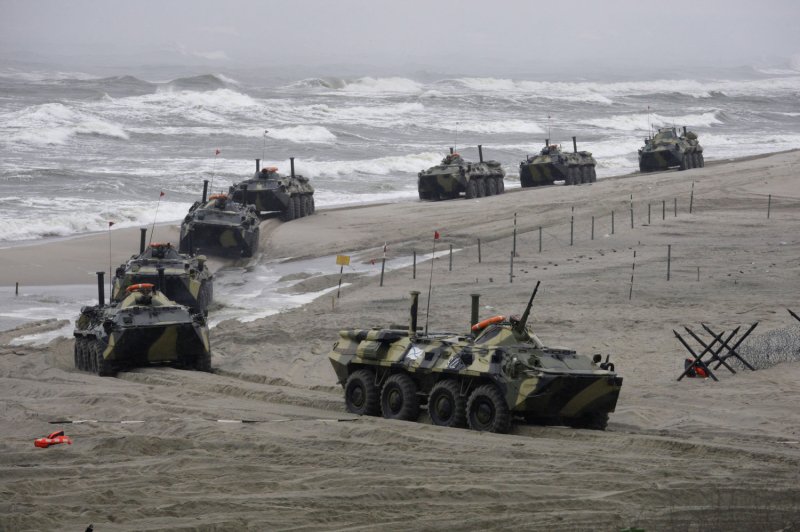Russian marines take part in the landing operation during the strategic military exercises Zapad-2009 (West 2009), at the Khmelevka training range in Kaliningrad region on the Baltic Sea on September 28, 2009. On June 30, 2015, the Russian chief prosecutor's office said it was investigating the legality of a 1991 decision to recognize the independence of the Baltic states. Lithuania, Estonia and Latvia, members of the EU and NATO since 2004, have increased their defenses following Russia's annexation of Crimea last year and accusations of ongoing involvement in the Ukraine conflict. File photo by Anatoli Zhdanov/UPI |
License Photo
MOSCOW, June 30 (UPI) -- Russia's chief prosecutor opened an investigation into whether it was legal for the country to recognize Baltic state independence following the collapse of the Soviet Union, according to reports.
The examination comes after the chief prosecutor concluded last week that the transfer of Crimea from Russia to Ukraine in 1954 was illegal, the BBC reports.
Russia annexed Crimea early last year in a move widely condemned by the West, which accuses Moscow of deploying troops in assistance of separatist rebels in eastern Ukraine.
The BBC quoted Lithuania's Foreign Minister Linas Linkevicius as saying the investigation was "legally, morally and politically absurd" and "a provocation to say the least."
Estonia, Latvia and Lithuania have over the past months built up their defenses, including a joint mid-range air defense system announced early in June, following developments in Ukraine and months of increasing Russian military activity around the Baltic Sea.
Russian armies occupied the three countries during World War II, incorporating them into the Soviet Union until its collapse in 1989, whereupon they were granted independence in 1991.
In 2004 Estonia, Latvia and Lithuania joined the European Union and NATO, which during the Cold War had formed to counter Soviet expansion.
Two Russian parliamentary deputies, Yevgeny Fyodorov and Anton Romanov of President Vladimir Putin's United Russia party, requested the examination of Baltic independence in a joint letter, saying recognition had been made "by an unconstitutional body," according to a source in the prosecutor's office quoted by Russian media. According to the BBC, the source said there will not be "legal consequences" if the 1991 decision is deemed illegal.















